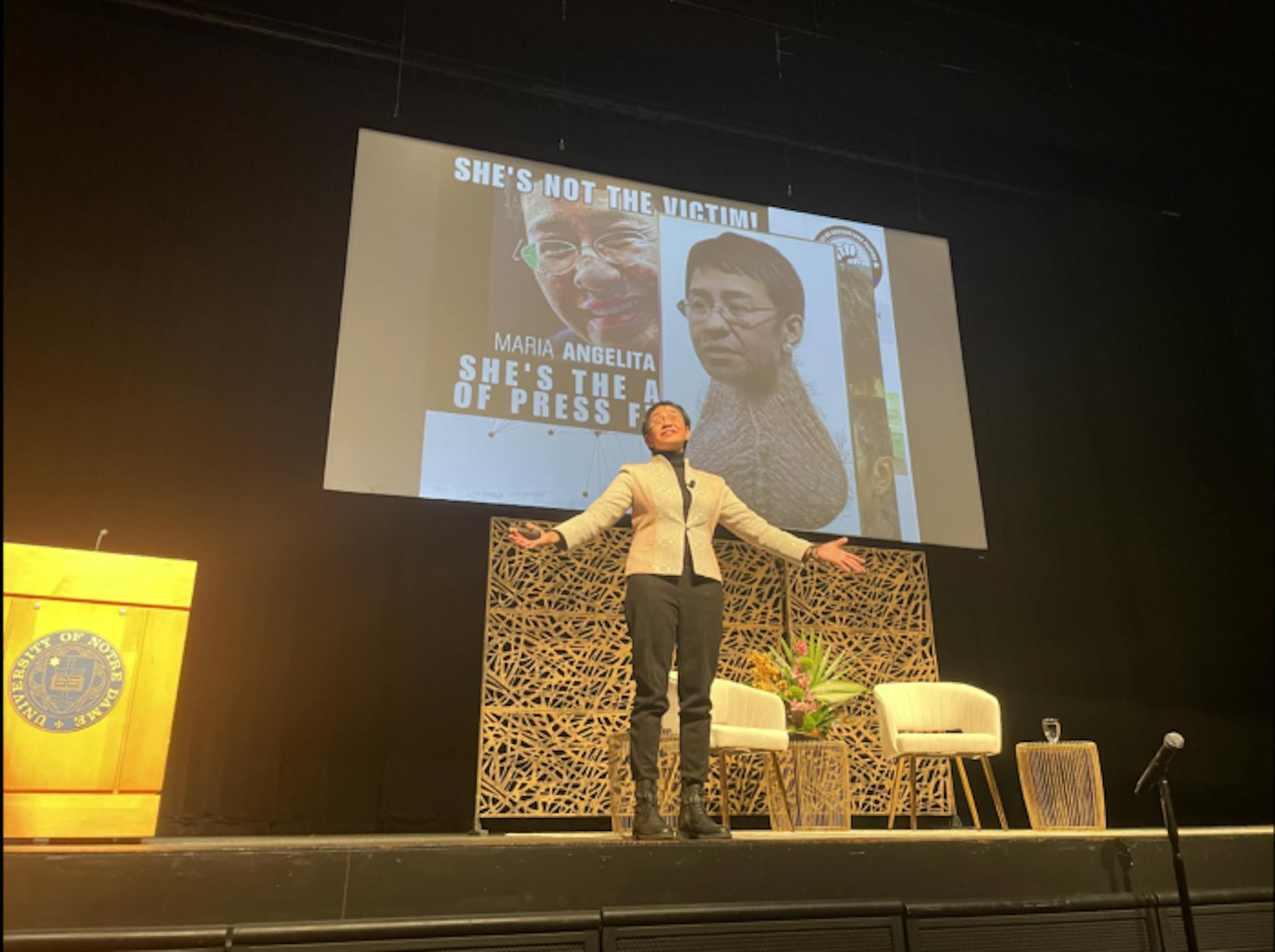“Disinformatsia is like cocaine,” Maria Ressa said in this year’s Asia Leadership Forum, citing the former KGB chairman Yuri Andropov. “You take it once or twice, you’re okay. But if you take it all the time, you become a changed person. All of us on social media have become changed people because lies spread faster than facts right.
Ressa, who was jointly awarded the 2021 Nobel Peace Prize alongside Russian journalist Dmitry Muratov, is a prominent reporter in the Philippines. Rappler, the digital news outlet she founded, has been targeted with a number of cases by the government under former President Rodrigo Duterte.
Michel Hockx, director of the Liu Institute, said Ressa was identified for the annual lecture by law and global affairs professor Diane Desierto, who has served as Ressa’s lawyer for seven years.
At the end of the event, Ressa recalled Desierto’s help in arguing for her before the Philippines Supreme Court, work that is ongoing as Ressa still faces a charge.
“She was my Hail Mary pass. What happened was, she had one week to do the filing of the Supreme Court and she stayed up three nights to come up with 80 pages,” she said
University President John Jenkins in his introduction expressed admiration for Ressa’s courage and values.
“We would be delighted to have such an influential figure here at Notre Dame in any case, but we are particularly inspired to have someone who has exhibited such courage and vision,” he said. “The values we hold dear here, protecting democratic institutions, standing up for truth in the face of systematic misrepresentation, supporting freedom of the press and relevant for our context, illuminating how technology can be used to manipulate and divide people.”
In her lecture, Ressa discussed her recent book “How To Stand Up To A Dictator,” emphasizing the role that social media can play in harming democracy, arguing that it “has become a place for information warfare.”
Ressa said that despite all the work that journalists do to accurately report on events they “cannot compete against outright lies.” Ressa pointed to a study conducted by MIT which “showed that lies spread at least six times faster than” facts. While journalists can be sued for libel if they lie, there are no such penalties in place for those who spread misinformation on social media, Ressa noted.
This disinformation can cause real-world “behavior modification,” Ressa said.
Ressa recalled the targeted harassment she’s received, in no small part because she was singled out by then-president Duterte.
She recalled how she was targeted for vulnerabilities, being branded on the internet as “scrotum face” because of her eczema condition. Displaying memes were also made to harass her, Ressa said.
“What has happened with social media is because they want to keep trolling you, your fear, your anger, you stay on longer if your emotions are triggered and when that happens, the platforms make more money. That’s the surveillance capitalism model,” she said.
Ressa pointed to the 2020 American presidential election as an example of how easily disinformation can spread online and the devastating consequences that it can have. The idea of election fraud was first entertained in the state media Russia Today in August 2019 before spreading to American media and then being endorsed by President Trump, Ressa said, arguing that the spread of ideas of election fraud would not have been as effective without social media.
“I don’t care whether you vote for Trump or not, but I do care that you have the facts. So this is a battle for facts,” Ressa said. “You cannot have rule of law if you do not have facts.”
Ressa also highlighted the importance of combating disinformation during upcoming elections.
“Between now, 2023 and 2024, there are almost 90 elections all around the world,” Ressa said. “If you don’t have integrity of facts, you don’t have integrity of elections.”
Ressa explained how social media plays to people’s emotions and encourages mob-like behavior causing good people to do things that they would not otherwise do.
“At an evolutionary level, the emergent behavior that is encouraged, that is rewarded, is the worst of us. It is the fear. It is anger. It is hate,” Ressa said.
The very nature of social media, too, encourages users to continue seeking content which stoke these emotions, Ressa argued. “When you’re on your platform, you have increased levels of dopamine, which causes mild addiction,” she said.
Ressa lamented that “if lies are rewarded, what world are we creating?” She also pointed to the difficulty of pushing back against these large social media companies, saying that there is no “bigger dictator” than Mark Zuckerberg.
“Every time I post on Facebook things, Facebook uses machine learning to build a model of me that knows me better than I know myself,” she said.
Ressa said that people need to “push for legislation” like a “better business bureau for your hearts and mind” that will rein in social media companies and those who perpetuate disinformation.
Nobel Peace Prize-winning journalist Maria Ressa discusses democracy and disinformation
Nobel Peace Prize laureate Maria Ressa spoke Tuesday evening in the Decio Theatre. She displayed images of memes made about her on social media during the lecture.









